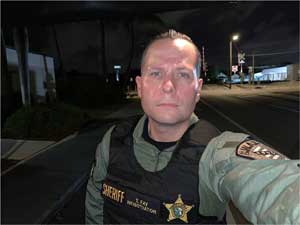 My name is Timothy Fay. I am a Detective and Digital Forensic Examiner and Hostage Negotiator for the Palm Beach County Sheriff’s Office in Palm Beach County, Florida. I think I was extremely interested in law enforcement from when I was very young. My hero growing up was an uncle of mine. He was a very decorated paratrooper in Vietnam, and he’s a 40 year veteran SWAT operator and team commander and he actually just retired as a Police Lieutenant. I think I always wanted to model myself after him. And so at 20 years old, I enlisted in the army after a few years of college as an Abrams tanker and after serving three years in the army with a combat tour in central and western Baghdad, I returned home and I knew that I wasn’t remotely prepared to sit in an office day in and day out, so I took the influence from my uncle and put myself through the Police Academy here.
My name is Timothy Fay. I am a Detective and Digital Forensic Examiner and Hostage Negotiator for the Palm Beach County Sheriff’s Office in Palm Beach County, Florida. I think I was extremely interested in law enforcement from when I was very young. My hero growing up was an uncle of mine. He was a very decorated paratrooper in Vietnam, and he’s a 40 year veteran SWAT operator and team commander and he actually just retired as a Police Lieutenant. I think I always wanted to model myself after him. And so at 20 years old, I enlisted in the army after a few years of college as an Abrams tanker and after serving three years in the army with a combat tour in central and western Baghdad, I returned home and I knew that I wasn’t remotely prepared to sit in an office day in and day out, so I took the influence from my uncle and put myself through the Police Academy here.
For me, the hiring process was pretty straightforward. It was basically the Academy at the state college where all the training and certification is held. You have to pass a certain amount of prerequisites before you’re even allowed into the Academy. The requirements to attend the academy can be similar to the requirements to become a police officer. You don’t actually have to be sponsored by an agency or have a job pending. You can pay your own way through the Academy, but they do model the admission process after what you would expect to see in any police agency. There can be a law enforcement entrance exam, in Florida the FBAT Test is the commonly used exam. There can be police interview questions, drug screening, a police fitness test, polygraph exam, psychological evaluations questions. It is also a requirement to pass a police background. So it was helpful because it took some of the mystery out of the whole process, and in the end, I was offered a job here just as I was exiting the Academy.
How to attend the Police Academy on Your Own
There are many states that require you to be sponsored by a specific agency to attend an Academy. There are also many states that only have a state run Academy. So things here in Florida are a bit different in that the state colleges, or community colleges, those are the ones that put on the police academies. Now the instructors for those academies are typically adjunct and the vast majority of them are either current or retired law enforcement officers from the area. And so the process here, what you just have to do is you apply and you don’t actually have to be guaranteed a job. You don’t have to have one pending because the agencies are not affiliated specifically with the Academy. You’re obtaining a state certification saying that you meet the qualifications to be hired. And so once you do that, you then actually, in my opinion here, is that you become more attractive to these agencies because you now have taken the initiative to put yourself through the Academy and you also didn’t cost them any money by doing so.
So they saved money and then they also have an opportunity, by having these employees who are adjunct instructors, they tend to let the agency know who they think would be a good hire. And so that’s a good way for them to recruit without spending a whole lot of money doing it. The tuition, when I went through the Academy in 2008, it was about $3,600. People want to know how long is a police academy, it was a full-time, six month process. You’re at the Academy at 6:00 AM Monday through Thursday or Tuesday through Friday and that is your entire life for those six months. And at the end of that, if you have passed every police officer exam, your defensive tactics and driving and firearms, you then meet the state qualification for certification. The reason I attempted to get picked up by the Sheriff’s office here was because being the third largest county here in Florida, they have quite a large agency.
We have about 3,500 employees and over a thousand sworn law enforcement officers. And so what that did for me personally was, because I wasn’t sure which direction I wanted my law enforcement career to go in, it provided me with the most options. And so I actually worked on a volunteer basis when I first started, because I was an unfortunate byproduct of the housing crisis and so they were willing to offer several of us unpaid positions in the hopes of having the budget for a paid position down the road, in which of course they did. Because we have several units in our agency that are just part-time, negotiator being one of those, in my second year of being a forensic examiner, I saw that position open. So I interviewed for the negotiator position and I was lucky enough to be chosen for that.
Hostage Negotiation Teams
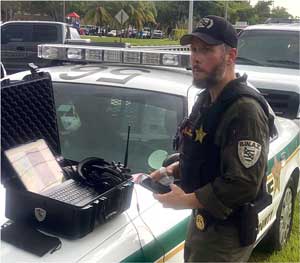
When I am not a primary negotiator, my job is also to be the basic technology hand of the team itself. We are trying to upgrade our technology that we employ, the most recent of which being these throw phone systems that allow us to provide the hostage taker, or person in crisis, with a cell phone, but the cell phone has the capability for us to monitor the scene itself from inside that we wouldn’t otherwise be able to have. The first job, regardless of who it is arriving on scene first, is intelligence. The more information you have, the better your negotiation is going to be.
We have two very important pieces of information that we always try to gather first, those things being hooks and triggers. Hooks are any type of information, any tidbit about things that may grab the hostage taker or the person in crisis, grab their attention in a positive way. Things that we could touch on that we know might help us build a rapport. The opposite of that is a trigger. A trigger is red words that, for whatever reason, would probably set this person off in a very negative way. And so the importance of knowing what those things are and trying to stay as far away from them as possible, that is absolutely the first job of the first person on scene. The intelligence gathering is always the most important. As the second or third or fourth team member begins to arrive, that’s when we start to set up our command bus that we have. We are very lucky.
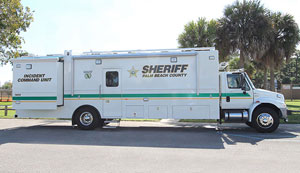
Negotiating with a former Navy Seal
One of the reasons that I got into negotiating was because as a Veteran, I see very often when I’m at the VA hospital, that there are always Veterans in some type of crisis. Unfortunately, Veterans in this country tend to be lost in the system. And unfortunately when we’re in a situation where we’ve had non-stop wars for the last 20 years, we end up with these soldiers, these airmen, these sailors who have had multiple combat tours, and they have expended all of their energy and given everything that they have.
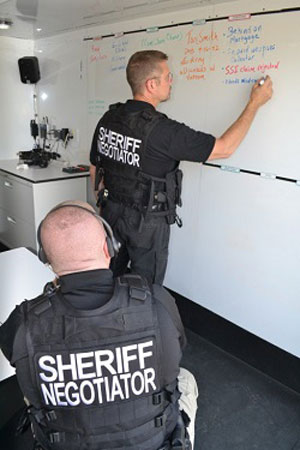
The other issue that was immediately faced as soon as we were called to the scene was that he was just firing a rifle erratically through his front door and through one of his windows. Now, thankfully he lives in an apartment complex that was set in such a way that the risk to the neighbors and the people around him was very low and we were able to evacuate any of the surrounding buildings just to ensure that we limited that risk of injury. So as the only recent combat veteran on my team, I decided to sit in as the primary negotiator and hopefully find some type of common ground with him. This gentleman, unfortunately, had just went through the anniversary of the loss of one of his team members to suicide, which is unfortunately something that we see in the military.
So my first goal was to find out which things were his hooks, which things could I discuss with him that might get him to allow me to build a rapport with him and gain some trust. But also find out which things were red button, hot topic items that I was going to try and steer clear of. And his biggest agitator, unfortunately, was just our presence. It wasn’t until his cell phone was beginning to die, that I was able to offer him one of our own cell phones. As soon as we were able to do that, he started to come around. He had no interest in me taking any opportunity to try and relate to him from a combat veteran standpoint. It wasn’t until I was able to relate to him from just a regular Veteran standpoint of I’ve been down and I’ve needed help and I was lucky enough to find assistance at the VA that I knew was helpful.”
I was able to convince him that the people that I deal with at the VA Hospital here in West Palm Beach, they were trustworthy and they were going to be there to help them. After about two and a half hours of negotiating with him, he was finally convinced to just surrender himself and we were able to end this dangerous, dangerous situation without any harm to anybody in the surrounding area and minimum harm to this gentleman.
Receiving the Life Saving Medal
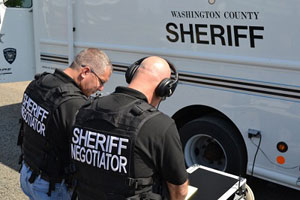
Myself and my partner Clint were the first ones on the scene and he is a former Marine Corps medic and myself having successfully completed our combat lifesaver training that we were given before we deployed overseas, we were quite familiar with those types of injuries. However, when we arrived on the scene, I was not prepared for what I was going to see. I had never seen someone with that amount of blood loss that was coherent and able to communicate with us. But the first thing that we did was Clint brought his combat lifesaver bag out with him and he immediately went to work removing this gentleman’s pants. This gentleman was a security guard for an apartment complex, and he, for whatever reason, was using the restroom and playing or just handling his firearm while he was in the restroom and he accidentally discharged it and it severed his femoral artery.
So when we actually arrived and we saw that he was conscious, the very first thing that Clint did was pack the wound with gauze and my job was to apply one of our combat tourniquets that we are issued. I actually, even before we were issued combat tourniquets, I brought that technology with me from the military, so I was extremely familiar with it and that absolutely helped me in this situation because it was just unbelievably stressful. This gentlemen was definitely on the verge of death and thankfully, we were able to stop the bleeding and get him onto a helicopter to one of our trauma centers here in Palm Beach County and we found out later that morning that they were able to keep this man alive and he was actually present when we were awarded the Life Saving Medal. It’s one of the most proud moments that I have working here at the Sheriff’s office. It’s just one of those things that you are not expecting, but if I’ve learned anything in law enforcement is that every day is going to be different and you have to be prepared for these things as they come and just work these problems regardless of what they are and just try to be as calm as possible.
Getting into Law Enforcement
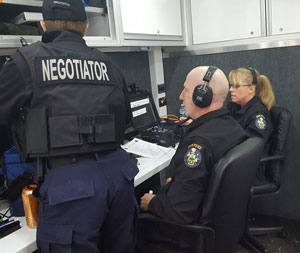
I would love to see that people that are considering this job, that they just need to have a passion for helping people. You don’t have to be interested in hostage negotiation or crisis intervention, but your job as a law enforcement officer, first and foremost, is you’re a counselor. You are the first person to help these people on what is most likely the worst day of their lives and unfortunately, we get complacent because we see it every day and we forget that when we’re interacting with someone who’s a victim of a crime, that it probably is the worst day of their lives. So I absolutely would say that you have to bring a passion to this job for helping people, regardless of what your interests are within law enforcement, whether it be investigations or aviation or bomb disposal, you absolutely just have to have a passion for people.
Related links

 Joseph Libowsky,
Joseph Libowsky,